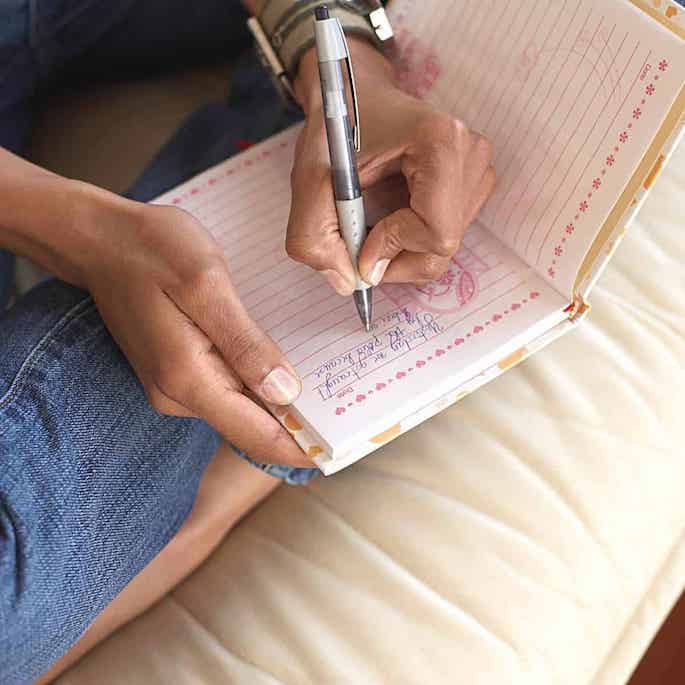Have you ever considered keeping a journal but just weren’t sure how to get started? Journaling is a simple and effective way to improve your life. This guide provides journaling tips for beginners to get into the writing habit.

A journal is a personal diary of your thoughts, progress, and accomplishments. It is a place for you to track your goals and reflect on your day-to-day experiences.
Keeping a journal can help improve your mental well-being, boost your creativity, and increase your productivity. It can also be a powerful tool for self-reflection and problem-solving.
If you’re looking for a way to improve your life, start keeping a journal. It’s one of the simplest and most effective tools available to you.
Starting a journal can seem overwhelming for beginners. Don’t worry, it’s easier than you think. In this blog post, you’ll learn how to start journaling for beginners so you can boost your productivity and mental well-being.
Table of Contents
How to start a journal
Journals can be a powerful tool for self-reflection and personal growth. They can also be wonderful ways to document your life, track your progress over time, and even create an ongoing dialogue with yourself about the things you want to remember about your life.
Maybe you haven’t always been able to continue a journaling habit. Perhaps you’ve tried, but it didn’t work out the way you wanted it to.
It is important to go at this with an open mind. If journaling is new to you or has had a difficult time sticking, try these steps on how to journal for beginners:
- Choose the right journal. There are many different types of journals available, so find one that best suits your needs. If you are looking for a place to track your thoughts and feelings, then a lined journal may be the best option for you. If you want to use your journal as a scrapbook, then choose one with blank pages.
- Set a schedule for writing in your journal. Decide how often you want to do so and stick to it! This will help you form the habit of writing regularly in your journal.
- Make journaling a daily habit by timing yourself. Instead of thinking about journaling in terms of long stretches of time, build a habit around shorter periods. If you write for two or five minutes each day, then you will be more likely to stick with it.
- Create a list of prompts that make you think, and use them to spark your creativity. Prompts are simple statements or questions that get you thinking about your life. These can be very helpful if you’re thinking on how to start journaling for beginners because prompts give you a place to begin. They can help you write about things you want to remember and want to share with others — things that are important to you.
- Pretend that you have an audience. You can address the journal to anyone you know, including yourself! You can even write to someone you admire.
- Keep your journal with you throughout the day. The best way to get used to journaling is to keep a journal close at hand, and write in it whenever you feel like it. This way, you’ll learn how easy it is to write about your thoughts and feelings, and explore things that happen in your life by writing about them.

What to write in your journal
Keeping a personal journal is a great way to document your thoughts and feelings, track your progress, and reflect on your experiences. But what should you write about? There are so many options! Here are some ideas to get you started on your first journal entry:
- Write about your goals and how you’re working to achieve them. If you are looking looking at a blank page in your journal, you can start by writing down your goals. Journaling on a regular basis can help you discover ideas, thoughts, and feelings that you never knew were there, or just hadn’t yet surfaced.
- Record your daily accomplishments, no matter how small they may seem. You don’t need exciting adventures every day to make a record of your life. You can have fun with the normal ups and downs, too! Write down a few notes to reflect on your day. Later, you will be glad you did!
- Document your thoughts and feelings about significant events in your life. In life, we have many experiences that can be considered wins. Start by noting things in your everyday life that made you happy, grateful, or proud.
- Write about things that inspire or interest you. The idea here is to write down whatever excites and motivates you. When something or somewhere makes you happy, write about it in your journal or take a photo to look back on.
- Reflect on your relationships with others. When you take time to reflect on your relationships with family and friends, you can improve them. Take notes on ways to connect with the loved ones in your life.
- Record your thoughts on self-improvement or personal growth concepts. When you keep a journal, you’re strengthening your connection with yourself (even if you are just learning how to start journaling for beginners). Nurturing your confidence, self-worth, and love for yourself will make you a better person.

How to keep your journal organized
There are many ways to keep your journal organized. You can use a planner, dividers, or folders to keep your journaling materials separated. You can also use different colored pens or markers to differentiate between different types of journals or entries.
Here are a few tips on how to keep your journaling routine streamlined:
- Decide on a system that works for you. There are many different ways to organize a journal — from topic-based, to chronological, to alphabetical — so find one that suits your personal writing style.
- Create folders or sections for different parts of your life. This will help you quickly find information when you need it. You can separate sections for your to-do lists, daily thoughts, and creative side.
- Use labels or color-coding to help further categorize your entries. This can be especially helpful if you have a large journal with many pages. You can color-code your entries in various ways, group them by color, or use one color per entry.
- Create calendars. Consider dedicating a section of your notebook to an at-a-glance calendar, or incorporate calendar sections throughout the journal.
- Use a tracker to monitor your progress. For example, maybe you’d like to track your new exercise routine and daily weight. Make some space in your journal where you can plot your data in a chart or graph.
Benefits of keeping a journal
Journaling can be a good way to escape from daily stresses and improve mental health. It also can help you get organized, manage your time better, and even relieve anxiety or depression. Many people have found that journaling every day makes their life better in many ways. Here are some of those benefits:
- Writing down your thoughts can help you sort them out. When you are constantly on the go, you never really have time to think. As you write each journal entry, you will release pent-up emotions by putting your thoughts on paper. This is one of the best mental health benefits of journaling.
- Journaling gives you a creative outlet. Writing poems, short stories, or songs make learning how to start journaling for beginners a little more fun. These activities help you relax and show off your talents. You might find that you have lots of ideas for stories and songs written in the spur of the moment!
- Keeping a journal can help you stay organized. Journal entries are a great way to plan your life — not just jot down your thoughts. When you plan your days in a journal, you can have a clearer idea of what has been achieved, what still needs to be done, and what your priorities are (key foundations when learning journaling techniques).

FAQs on how to start a journal for beginners
If you don’t see your question answered below, don’t be afraid to let us know in the comments!
How do you start off a journal?
Get the right journal for you and just start writing. If you don’t know where to start, write about what’s happening right now or a feeling you’re having. To make it a habit, set a schedule, time yourself, and create a list of prompts that will help you begin.
What should I write in my journal?
You can write anything you want! You can write with your dreams, your goals, your daily events, your thoughts and feelings — basically the things you can write are limitless. Be brave, bold, and brutally honest. After all, it’s YOUR journal!
How do you start an introduction to a journal?
Write directly to someone you know, or write to yourself as though you were speaking to someone else. You can even write as though you are speaking to a person you admire. Just let the words flow out of you onto the page. Don’t overthink it.

Other Articles You May Be Interested In
If you enjoyed this piece on how to start journaling for beginners, consider checking out the following posts:

